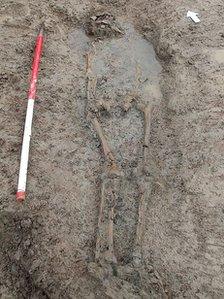Water mains work unearths Roman cemetery in Somerset
- Published

Several Roman human remains were discovered at Banwell in Somerset
A Roman cemetery containing several human burials has been found during work on a new water mains in Somerset.
The finds were made by archaeologists during the laying of a four-mile (7km) long mains between Banwell and Hutton.
Among the skeletons, which have been exhumed for further study, there was one in a partially-preserved coffin.
A Bristol Water spokesman said the excavation had been described as "potentially the most important for 100 years in North Somerset".
The cemetery was discovered "isolated from the surrounding landscape" in a curved water-filled ditch.
Roman cemeteries, according to Neil Shurety from Border Archaeology, are generally sited outside settlements and away from areas of human habitation.
Pottery and brooches
"In this case, the cemetery is evidently associated not with a town but with a villa site and it could thus represent a private burial ground serving a wealthy landowner and his immediate family," he said.
The human remains were orientated north-south "with the head to the north, which suggests a pre-Christian burial practice," said Mr Shurety.
"One of these individuals seems to lie within a partially-preserved wooden coffin - constructed from timber planking," he added.
He said the site provided evidence of a "landscape almost continually in use for the last 5,000 years".
"It covers a period ranging from an intriguing prehistoric timber structure to a Roman cemetery and defensive ditches through medieval land management features to today's agricultural activity," he said.
The finds, which include an estimated 9,000 pieces of pottery, brooches, a coin of Constantine the Great and a pin of Roman date are due to go on display at Banwell Village Hall on 19 November.